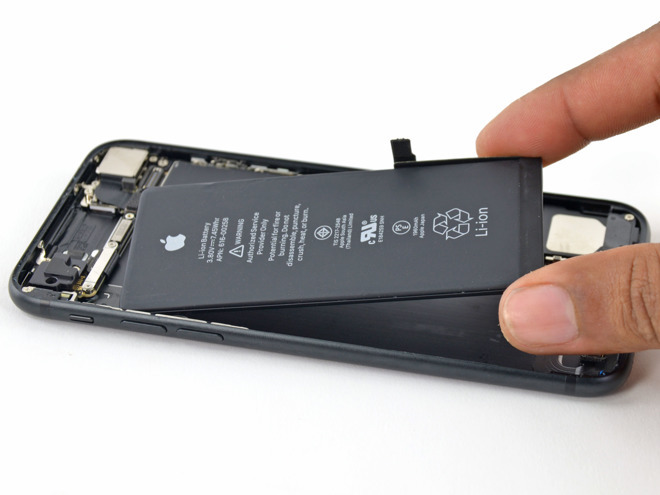Apple paying $113M to settle multi-state investigation into iPhone throttling
Apple will pay $113 million to settle a multi-state investigation of an iOS mechanism that throttled iPhone performance to prevent random shutdowns and preserve battery lifespan.

Credit: iFixit
That mechanism, which came to light in 2017, drew scrutiny from consumers and regulators who saw it as evidence of a so-called "planned obsolescence" scheme. The investigation involves nearly three dozen states and was led by Arizona, Arkansas, and Indiana.
On Wednesday, the states secured a financial penalty and legal commitment by Apple to be more transparent about similar mechanisms in the future. Investigators from 34 states and Washington, D.C. joined the settlement, The Washington Post reported.
The lawsuit originates from an issue with the iPhone 6 in 2017. Aging iPhone batteries were causing devices to shut down intermittently during peak operations, especially when at a low percentage. Apple countered this by quietly releasing an update that would throttle peak processing power during certain conditions to prevent those random shutdowns.
The update came and went without much notice. In 2017, users of older devices complained of slow speeds, however, and Apple eventually admitted to throttling old devices to mitigate shutdowns. That led to the so-called "Batterygate" controversy.
Despite attempts to educate users, Apple was targeted with multiple lawsuits, which pushed Apple to take action.
The Cupertino tech giant implemented new features that allowed to view battery health in the Settings app. Apple also lowered the price of battery exchanges for some models.
Along with the financial penalty levied on Wednesday, the states will also require Apple to clearly disclose its battery health and power management systems -- both on iPhones and online. Apple's existing battery health routines in iOS and macOS seem to cover what the states have required

Credit: iFixit
That mechanism, which came to light in 2017, drew scrutiny from consumers and regulators who saw it as evidence of a so-called "planned obsolescence" scheme. The investigation involves nearly three dozen states and was led by Arizona, Arkansas, and Indiana.
On Wednesday, the states secured a financial penalty and legal commitment by Apple to be more transparent about similar mechanisms in the future. Investigators from 34 states and Washington, D.C. joined the settlement, The Washington Post reported.
The lawsuit originates from an issue with the iPhone 6 in 2017. Aging iPhone batteries were causing devices to shut down intermittently during peak operations, especially when at a low percentage. Apple countered this by quietly releasing an update that would throttle peak processing power during certain conditions to prevent those random shutdowns.
The update came and went without much notice. In 2017, users of older devices complained of slow speeds, however, and Apple eventually admitted to throttling old devices to mitigate shutdowns. That led to the so-called "Batterygate" controversy.
Despite attempts to educate users, Apple was targeted with multiple lawsuits, which pushed Apple to take action.
The Cupertino tech giant implemented new features that allowed to view battery health in the Settings app. Apple also lowered the price of battery exchanges for some models.
Along with the financial penalty levied on Wednesday, the states will also require Apple to clearly disclose its battery health and power management systems -- both on iPhones and online. Apple's existing battery health routines in iOS and macOS seem to cover what the states have required

Comments
Despite attempts to educate users, Apple was targeted with multiple lawsuits, which pushed Apple to take action.
I didn’t need to be educated about how batteries work. I needed Apple to disclose that they radically changed my phone’s performance characteristics, and I deserved to be a party to that decision.
Where Apple dropped the ball on this is on the communication. Even as an engineer I want to know when my device has entered a degraded mode of operation, along with guidance about what I need to do about it. If Apple had popped up a warning that my phone was running in a degraded manner because the battery was overloaded or lacking capacity along with instructions to seek out a service appointment at my earliest convenience the outcome would have been a whole lot better for Apple. At least I would know that something was wrong with my phone and that I could continue to use it at a lower level of performance until I could get it in for service. Limping home is better than being stranded.
It's too bad that Apple has to pay such a high penalty for a communication shortcoming. I truly believe that most other companies would not have been judged so harshly for what was a well intentioned reaction to a problem. Apple obviously didn't want to strand their customers with no service. But once the lawyers step in and public pressure to "make someone else (with deep pockets) pay" gets ratcheted up this is where we are. I hope Apple learns from this experience, especially those engineers who too often develop a siloed mentality that isolates them from swaths of customers who don't see the world in exactly the same way that they see the world. Empathy isn't sympathy, it's a critical facet of knowledge acquisition and discovery. Apple's engineers came up a little short on in it this time, so now they get to pay for a remedial lesson.